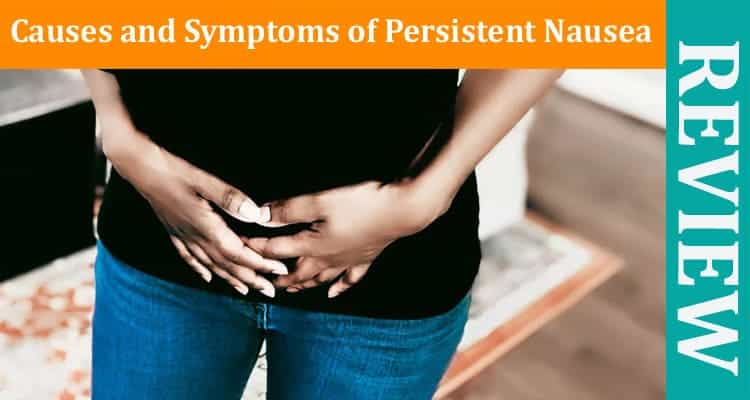Persistent nausea can be very difficult to deal with because you feel like it will never end. Having a queasy stomach causes other health concerns, as well. For example, you may have difficulty eating when you suffer from chronic nausea. When you don’t get proper nutrition, it can lead to vitamin deficiencies.
You may also avoid social events because you constantly feel uncomfortable. If you suffer from persistent nausea, read on to learn what can cause it. We also offer valuable tips on improving your symptoms and finding relief.
Table of Contents
Gastroparesis
Gastroparesis is a condition that causes your stomach to empty very slowly after you eat a meal. Unfortunately, it can cause severe chronic nausea. When you have gastroparesis, you’ll typically feel nauseous shortly after eating. Your stomach fills up with the food and liquid you eat. The result is the distension of your stomach causes nausea. Since your stomach empties so slowly, your nausea will continue for quite a while. Typically, your food digests, and you don’t experience this discomfort. Yet, with gastroparesis, nausea is an ongoing concern.
You can often control the symptoms of gastroparesis with prescription medications. These medications can help prevent nausea. You may need surgery if you have severe gastroparesis and your stomach doesn’t empty. In a worst-case scenario, a doctor surgically implants a feeding tube in your small intestine to bypass your stomach.
Gastroesophageal Reflux Disease
Gastroesophageal reflux disease, commonly called GERD, can also cause chronic nausea. GERD causes some of the acid in your stomach to come up your esophagus. You’re more likely to experience symptoms when lying down to sleep. You may also experience discomfort after a large meal when your stomach is extra full. The acid from your stomach causes a burning pain in your throat. You also experience nausea.
If you have GERD, you can treat it with an over-the-counter medication called a proton pump inhibitor. Proton pump inhibitors reduce the acidity of your stomach acid. So, it’s less painful when it travels up your esophagus. This also helps reduce the amount of nausea you experience.
One side effect of proton pump inhibitors is that they reduce your body’s ability to absorb calcium. So, you’ll need to take a calcium supplement when taking a proton pump inhibitor.
Stomach Ulcer
An ulcer is an open sore on the lining of your stomach. It causes pain and chronic nausea. Eating spicy or sour food typically aggravates them and makes them more painful.
Stomach ulcers are commonly caused by a species of bacteria in your stomach called Helicobacter pylori. The bacteria break down your stomach lining and cause an ulcer to form. Ulcers can also be caused by taking non-steroidal anti-inflammatory drugs (NSAIDs) like ibuprofen and aspirin. When taken too often, NSAIDs can damage your stomach lining.
If you have a stomach ulcer caused by bacteria, you can treat it by taking antibiotics. Of course, you will need to visit your doctor to get a prescription.
If your ulcer is from taking NSAIDs, you must discontinue them. That way, your stomach lining can heal. While your ulcer is healing, you can reduce the pain and nausea by taking an over-the-counter proton pump inhibitor.
Anxiety
A cause of chronic nausea that’s often overlooked is generalized anxiety. Anxiety causes your body to release a surge of stress hormones like adrenaline. When you feel adrenaline, your body prepares you to fight or run from the threat. One side effect of the sudden release of stress hormones is nausea. If you suffer from constant anxiety, you may experience chronic nausea as a result.
If you have persistent nausea, scheduling an appointment with your doctor to determine its cause is essential. A doctor can prescribe anti-nausea medication. Medicine that combats nausea helps settle your stomach and reduces your symptoms.
Besides anti-nausea medication, getting help for your anxiety is important. Reach out to a therapist so you can tackle the root of your anxiety. Working through your problems together can reduce your anxiety. And when your anxiety lessens you should experience less nausea.
Medical Marijuana
It may be that prescription medications don’t end up helping with nausea. Or, you prefer to go the natural route with an at-home remedy. If that’s the case, think about using cannabis for nausea. Cannabis helps relax your digestive system, making you feel less nauseous. Certain medical conditions qualify you for medical marijuana. So, depending on your state, get in touch with a medical marijuana doctor. For example, if you live in Connecticut, there are medical marijuana doctos available that can get you a prescription. (Learn how to go about getting a medical marijuana card in Connecticut here.)
Conclusion
Even if you’re uncomfortable now, don’t give up hope. There are treatments options for nausea. Remember to improve your diet and focus on your nutrition. Working out and going on regular walks can also help curb nausea. And, make a point to come up with a treatment plan with your doctor.
With proper treatment, you can live your life without the constant discomfort caused by chronic nausea.


